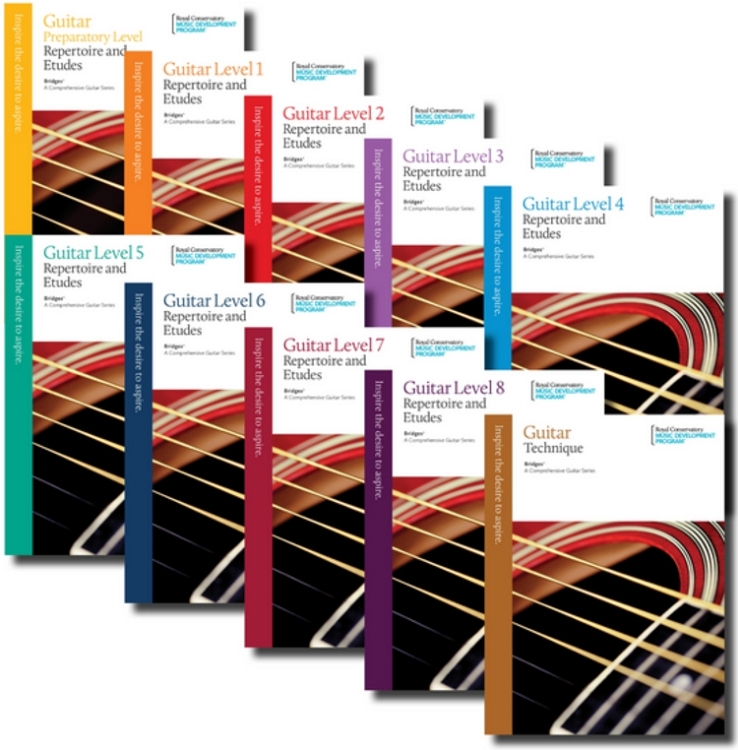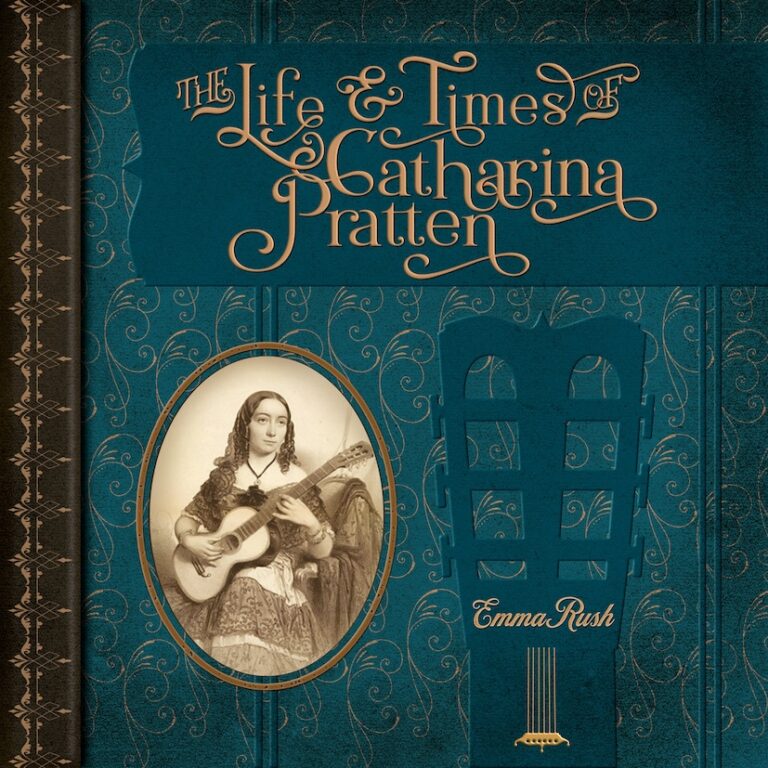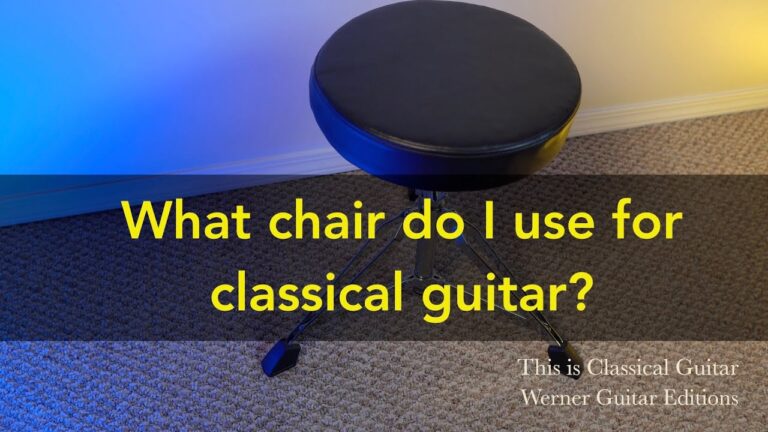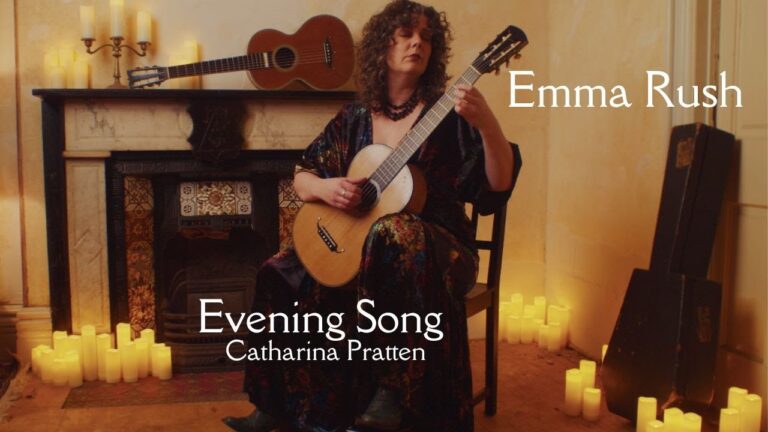Update: See the new RCM Classical Guitar Series 2018

2011 RCM Bridges Guitar Series
I went out and bought the entire collection of the 2011 Bridges Guitar Series by the Royal Conservatory of Music (Toronto) and Frederick Harris Publishing. The price was very moderate making the series an excellent choice for the average student. They are now Branded across the US and Canada as: Bridges® A Comprehensive Guitar Series. There are different covers in circulation but they are the same books as long as they are branded as Bridges.
Buy the books:
Amazon.com (US): Bridges Guitar Series
Amazon.ca (Canada): Bridges Guitar Series
Overall Conclusion: The books have better looking notation and design and have been cleaned up as far as cluttered fingering goes. The Series is more accessible and has finally included great repertoire such as Brouwer, Villa-lobos, Ponce, Barrios, and more. I have never used the RCM books heavily in my studio but the new series definitely encourages me to use them more, especially for students at the Grade 6 to 8 level. I’m even adjusting my new method books to feed into the RCM so that I can seamlessly transfer the students over. A much improved revision and a joy to see the series moving forward and including some classic repertoire as well as a few new gems.
Reviews of each book:
Bridges: Guitar Technique: A cleaner and slightly easier technique book this time. They got rid of the three finger scales which is probably a good thing for most teachers and students looking to focus on foundation skills but still a bit sad since three finger scales are a part of modern playing. The tempos are also more relaxed making the exams much more accessible. However, I don’t love the fingering in many of the scales and particularly hate those 4th finger descending shifts in some of the scales – it is a weak technical concept of fingering for students even if it is good for them on some weird level. I’m assuming the various different fingering for each grade is supposed to teach the student various way to finger scales but I find it confusing for the student. Also, I just don’t see the connection between scales and repertoire as far as their fingering goes. Open-string shifts should be included. It is not until grade 8 that they say students can use any logical left-hand fingering and leave the fingering blank – this is a great move forward and emphasizes the importance of having a good teacher. Overall, I approve of the changes and will be more likely to use the new technique book with students.
Bridges: Preparatory Guitar Repertoire and Studies: Larger notation print and less cluttered. There are a number of new additions such as composers Ogawa, Kiselev, McFadden, and Rak making it a bit more modern. Improved and more accessible. Likely more successful for students which is so important at this level.
Bridges: Guitar Repertoire and Studies 1: Larger notation, and much less cluttered than the last edition. Again a few new works and the usual Carulli dances etc… I like that they put in new works such as Fleur de Lotus by Carbajo, even if you don’t like the compositions they work very well on the instrument and I think it’s very important to have materials that will be successful with students. McFadden and Domeniconi are in there too. I don’t love the McFadden works but my students always like them and that is what counts the most…
Bridges: Guitar Repertoire and Studies 2: The same as the previous book for the most part. Cleaner and more sparse in fingering which will make it easier to teach from…I used to have to scratch out so much when adding my own fingering concepts. It’s an improvement.
Bridges: Guitar Repertoire and Studies 3: Pretty much the same except for the additions of Blum, Jackman, McFadden, Tisserand and more… The new works will be popular for their high amount of activity and excellent effort-to-success ratio. The Blum is kind of boring but students will eat them up for how brilliant they sound (arpeggio land!). The Rumba by Tisserand is welcomed as I hate always having to find that one rumba or flamenco piece while teaching and then photocopying because I won’t make my students buy 20 different books…
Bridges: Guitar Repertoire and Studies 4: I was really hoping that I would have seen some Brouwer, Barrios, or Pujol by this grade but they saved it for the later grades. When I look at the repertoire in RCM piano books the guitar composers have a hard time competing. And we wonder why so few youth are drawn to classical guitar. However, it’s getting better and the works by Domeniconi, Gagnon, Zenamon, Kleynjans help. The Renaissance section of this book is where the real quality sits but I am unsatisfied by the Classical/Romantic repertoire. I would have liked to see Mertz in there and I can’t see why he was left out. Is it just me who thinks Mertz is plainly higher quality than much of the other Romantic fare?
Bridges: Guitar Repertoire and Studies 5: Notation is no longer big and chunky which is appropriate for more mature students at this point. The fingering is highly, highly reduced which is just wonderful. Again no Mertz, Brouwer, or Barrios but there are some nice selections from Giuliani, Sor, Coste which are getting to be more interesting compositions. Carcassi is welcomed in the studies and the Renaissance section is again strong. I like the inclusion of Benedict, Maximo Pujol, Kleynjans, Katz, Yukich, Bosch and more…this is better but the next grade is the big quality jump…
I personally recommend the following grades (two thumbs up):
Bridges: Guitar Repertoire and Studies 6: I am so happy for students and teachers that buy this one. Finally we have Bach, Weiss, Milan, Mertz, Ponce, Barrios, Brouwer, and Villa-lobos! These are the composers that will keep students interested in the guitar. I will definitely use this book with all my students at this level and proudly give it my full recommendation.
Bridges: Guitar Repertoire and Studies 7: As with grade six we have Bach, Weiss, Milan, Mertz, Ponce, Barrios, Brouwer, and Villa-lobos…but also some Walton, Brindle, Hand, Gagnon, Sanz, Milano, even some Bonfa! Seems the notation gets cleaner as we go up as well. Another thumbs up for this one.
Bridges: Guitar Repertoire and Studies 8: As with the other books you just can’t have “all-inclusive” repertoire collections without the great composers and they again included some great selections here. Nice to see the Tiento Antiguo by Rodrigo in there too.
That is pretty much all I have to say, the syllabus for the upper grades past gr. 8 have been made a bit easier and more accessible which is a good thing. I would like my students to definitely play grade 10 exams without too much strain and I think the new syllabus will allow that…
Overall, congratulations to the RCM for a much improved series!




